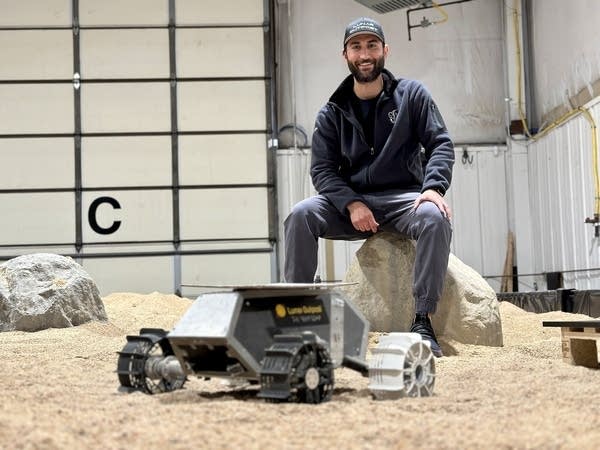Colorado’s Front Range has the densest concentration of space industry workers in the country. More than 60% of the companies in that state employ fewer than 10 people. Meanwhile, In the last decade, commercial rocket companies like SpaceX have brought down the cost of getting stuff into space dramatically — by as much as 90%.
That has meant brand-new opportunities for small space startups, and you might say the moon is about to be open for business.
Not too many Coloradans have spent an afternoon lounging at Crater Beach. That’s probably because it’s inside a warehouse in the city of Arvada. It’s the nickname for a giant open box filled with about 30 tons of sand and artificial boulders. A small rover was recently rolling around Crater Beach, testing its autopilot software. The rover was developed by small space startup Lunar Outpost. Justin Cyrus is the 30-year-old CEO of the company, who started his career with commercial space giant Lockheed Martin.

“But I wanted to be in an area of space where we can innovate more and move a little bit quicker,” he said.
His company has about 70 employees, and the autopilot tests are some of many they need to run before they send one of their rovers for the first landing on the south pole of the moon later this year.
“It’s a renaissance in space right now,” said Bob Cone, 30-year industry veteran and chair of the Colorado Space Business Roundtable. “I have never witnessed the confluence of really positive effects for an industry, in this case, aerospace, like I have in the last five to 10 years.”
In Colorado Springs, there’s a tech incubator called the Catalyst Campus that connects small tech startups with federal space defense contracts. Dawn Conley, who runs the incubator, said the days of looking only to the biggest companies are over.
“The reliance on the space domain … especially how the military conducts some of their business, has evolved and is very important and progressive,” Conley said.
Cheap rocket launches have been a boon for all sorts of technologies in orbit such as satellites, military space warfare and more. Now we’re on the cusp of seeing that stretch beyond Earth’s orbit, and that’s exactly where Lunar Outpost is trying to find a niche.
“Where we ended up is industrial robotics for extreme environments,” Cyrus said.
The vehicle slated to crawl off a lander on the lunar south pole in November is aiming to be the first commercial project of its kind.
The rover’s main mission is testing the range and strength of a Nokia 4G cell tower that’s embedded in the rover’s lander. The rover itself cost tens of millions of dollars.
That may sound like a lot, but compare that to previous NASA rovers, which have cost billions of dollars each.
“That’s what it’s going to cost if you have to have 99.99999% chance of success,” Cyrus said. “However, if you’re willing to accept an 80% chance of success, you can send dozens of rovers.”
To that point, even if something goes wrong with this first rover, Lunar Outpost has three more launches planned in the next three years.
In addition to various private space enterprises, many commercial space companies are contracting with the United States government as part of NASA’s Artemis missions, with the goal of sending humans to the moon again to set up a permanent research base.
Last summer, my colleague Kimberly Adams spoke to Peter Garretson, co-author of “Scramble for the Skies: The Great Power Competition to Control the Resources of Outer Space.” They discussed what a U.S.-led lunar economy could look like.
And on Marketplace’s “Make Me Smart” podcast, Garretson’s co-author, Namrata Goswami, said the space economy is already worth about $400 billion. It’s expected to shoot up to about a trillion dollars by 2030.